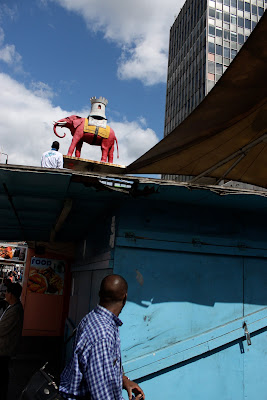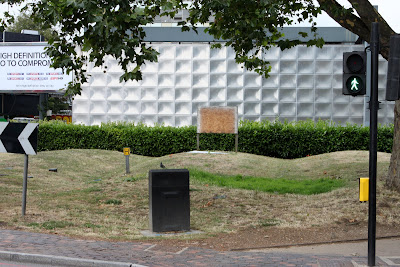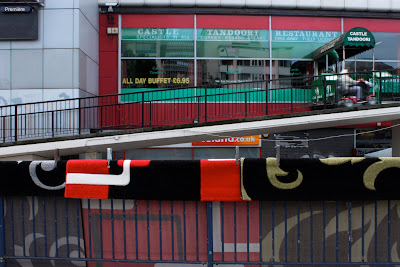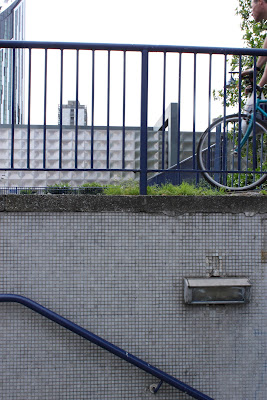A Pause at the Elephant and Castle by the Landless Landlord



In the holiday season, even the under-employed have at least the right, if not the means, to some involvement. My own means, and those of my blogging peers, were to be a van I had the use of for a job. The idea was, I'd be off to Sussex to pick up some barrels for London, but pay would consist of the loan of the van for the weekend plus knock-down board at the brewery tap. The Archaeologist reckoned this would be the ideal time for all of us to get a day out of town. Team building, need for an away day to get the city in perspective. The only way you can approach a subject, he enthused, by definition from outside.


None of us had done such a Saturday morning journey in some while, so none of us was aware of just how many did, London choking under the effort to get away, one road after another strangled to standstill. The three of us, not as used to the South side of the river as we seemed to think, trying to avoid its endlessly clogged arteries, slowly wound the van into a state of desperate exasperation until, lost in some back street, steam billowing from the bonnet, it gave up.


Elephant, apparently, where I was to spend the day. There was no point in the others waiting. They'd make their way to Victoria for the train, I'd wait out the repairs and hope to join them by nightfall.


My stay, I hoped, would not be fruitless, anyway, in its way, the Elephant and Castle a site, thanks to the pub it originally referred to, in need of research.


It's the basic human need for rest the pub responds to, institutionalises, names - rest and recreation.

And since these names are at the heart of the question that may lie behind the whole point of this blog, they need reflection here.

Because it may be that I, the Windowless and the Archaeologist are simply asking: What is a city - in reference this one in particular, because, for its inhabitants, endless as our lives as we know them, it is what a city is.


A pause on a journey, over centuries; continuity, frozen, the fixed.


Where people die, cities endure - cities are foreign to life. Cities, the most familiar no less than the strangest - the most familiar after all the strangest - are left by that foreign race our ancestors on their journey from life to death. Whether they, like us, found or founded it, it was to them as it is to us, as life is - however familiar on the surface, to that extent deeply strange.


Try to imagine a people, however nomadic, who could dispense with place names. Life, and everything in it, must pass. What it must pass is places. The places passed through, the places it pauses, seeks shelter, where it farms, refreshes itself, gathers, meets and makes. These places, the mystery of its opposites, must get proper names, capitals, marking, in the currency of the word, the pole of the fixed - something to talk about, where the talking happens, the conversation is going or will resume.

So it is that the most common siting of the pub sign become toponym is on the old routes out of town. The map of London could have a pin in it, collecting radial threads for roads extending out; on these, guaranteed, the phenomenon will be overrepresented - Angel, Swiss Cottage, the Nag's Head; the Elephant, in its way, pre-eminent. It's because they were coaching inns, of course, discussed from afar as a destination, known as a place someone had stayed, in the nameless spaces of the open road, where the host was, drink, conversation flowed.


The Elephant and Castle, horse and inn; on the journey, but the pause.


There are other suggestions for the origin of the name, of course - always should be - but I don't see why I, of all people, should find them convincing. The origin was a pub, the same pub as is referred to already in the days of Shakespeare for a place of ill repute, which, itself passing away, left its name in legacy.



Every city - built, under construction or perhaps even still in plan - is the abandoned ruin of a past age. Those that cannot bring themselves to see this - a group including not only all its inhabitants, but anyone who uses it so much as to pass through: these are the ghosts that haunt it, giving it, to the unsuspecting eye, the appearance of life.


I wondered, as I circled the roundabout in investigation, waiting for the call from the garage, whether I, for once, had been allowed a glimpse of this by the fact of the accident of my presence there, of being supposed to be far away with the other bloggers on the Sussex coast.




well, i hope you'd find your way to sussex ! (you should have taken your bike, although i suspect that your decison is a tricky way to stay forever in the city..)
ReplyDeleteThe limitation with the bike's the barrels it can't bring. Perhaps I should have taken a leaf out of Young's recently discarded book: horse and carts for delivery are surely less prone to break down. However, you may be right that there are obscurer causes than mere mechanics keeping me forever in the city bounds. If they're tricky decisions, presumably I should be setting myself to discovering who lays those tricks, or makes them so appealing?
ReplyDeletemm, who knows ? the rover inside your mind ?
ReplyDeleteActually, come to think of it, the van was indeed a Rover - ex-BT Sherpa. So would the decline of industrial Britain be behind all this?
ReplyDelete